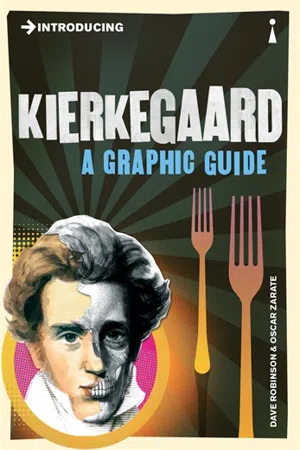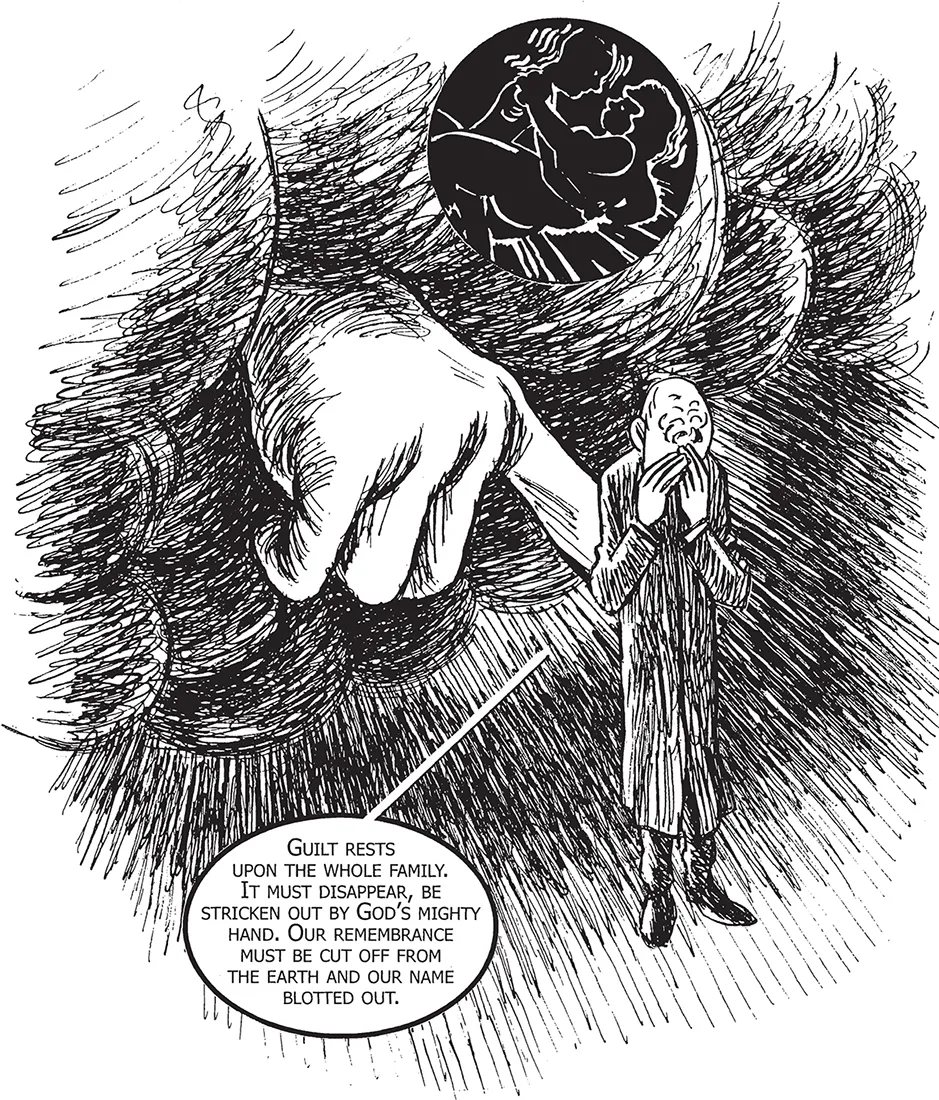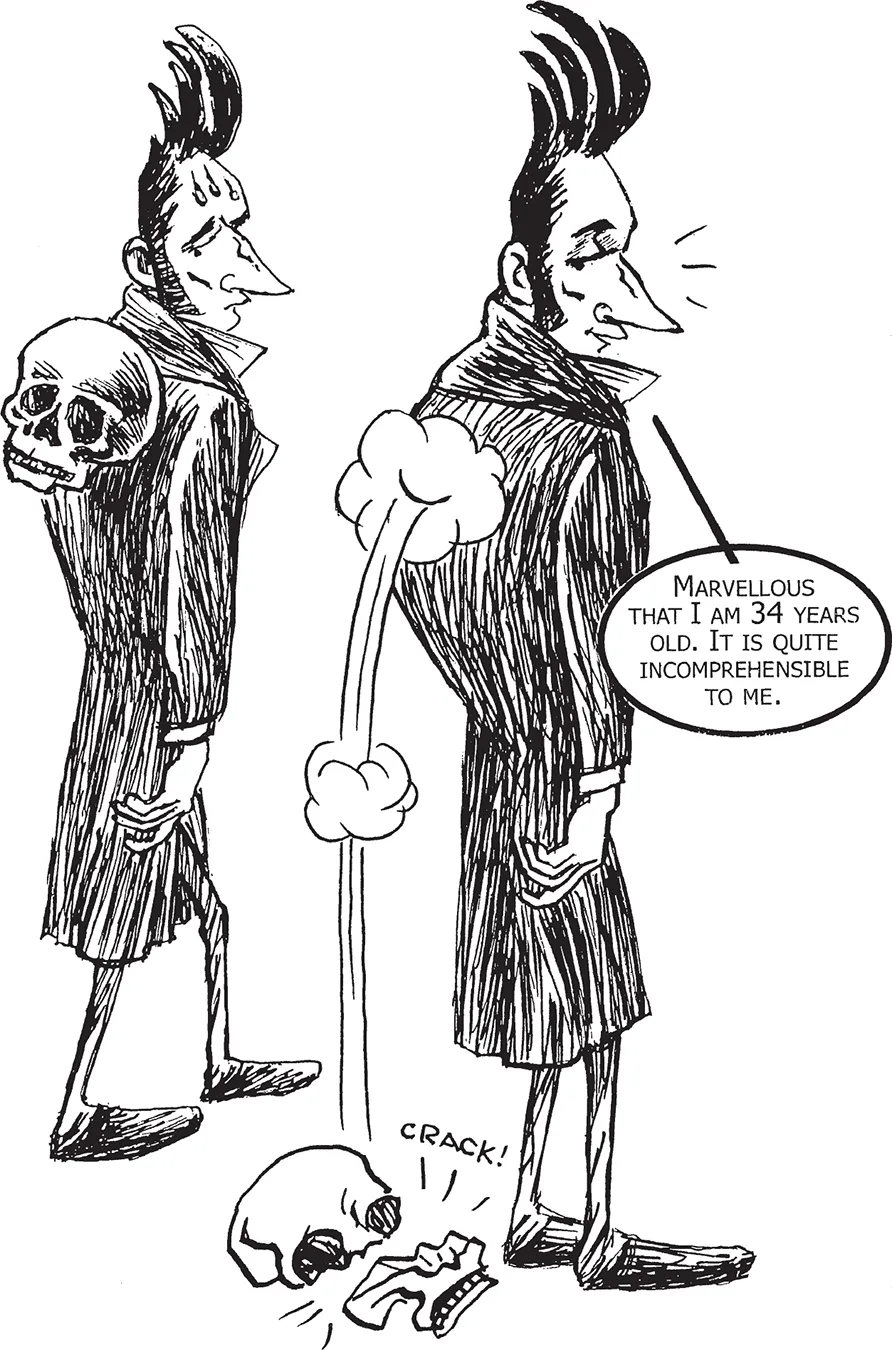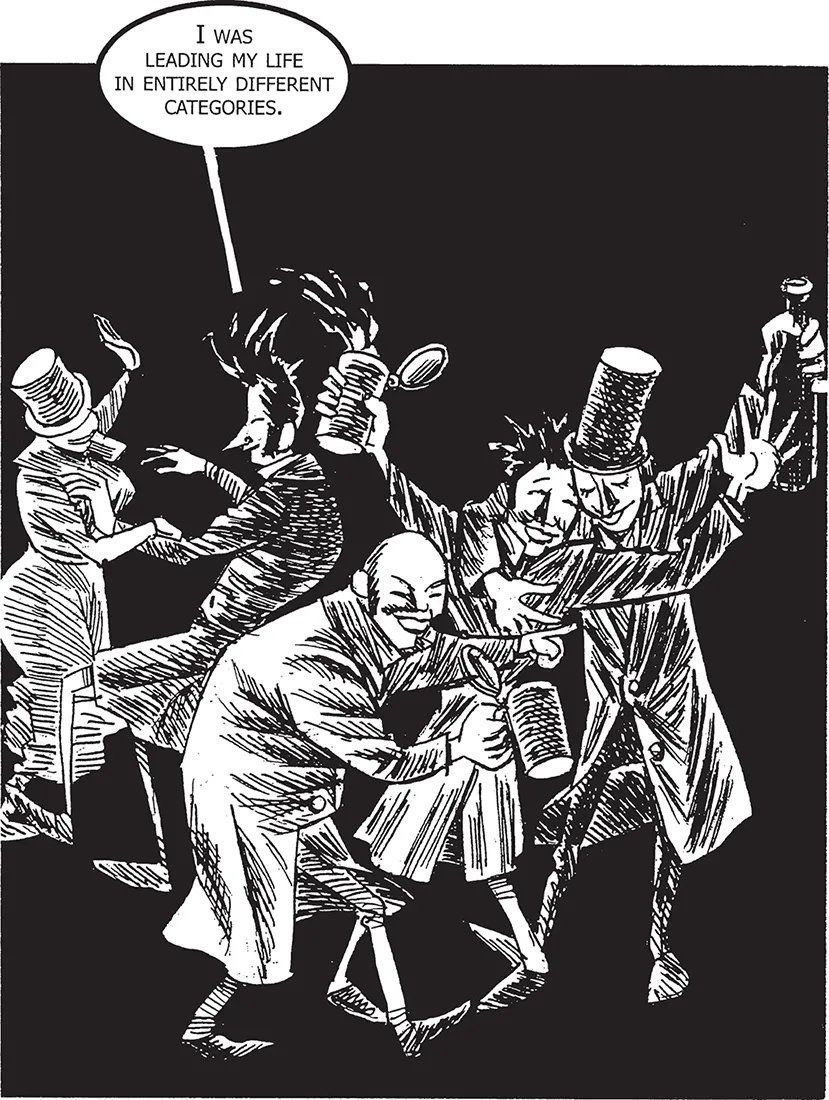
- 176 pages
- English
- ePUB (mobile friendly)
- Available on iOS & Android
eBook - ePub
About this book
Father of existentialism or the Eeyore of philosophy?
Known as the first modern theologian, Søren
Kierkegaard was a prolific writer of the Danish 'golden age'. A philosopher,
poet and social critic, his key concepts of angst, despair, and the
importance of the individual, influenced many 20th-century philosophers and
literature throughout Europe.
Dave Robinson and Oscar Zarate's brilliant graphic
guide explains what Kierkegaard means by 'anti-philosophy', and tells an
illuminating story of the strange life and ideas of a man tortured by his
attempts to change the very priorities of Western thought.
Tools to learn more effectively

Saving Books

Keyword Search

Annotating Text

Listen to it instead
Information
Topic
PhilosophySubtopic
Ethics & Moral PhilosophyA Radical Change in Philosophy
For over 2,000 years, philosophers had insisted that their primary task was to establish what counted as certain and reliable knowledge. Søren Kierkegaard violently disagreed. The job of philosophy wasn’t to tell us what we could know. It had to tell us what we should do.

WHAT GOOD WOULD IT DO ME TO DISCOVER SOME SO-CALLED OBJECTIVE TRUTH?
WHAT I REALLY NEED TO HAVE CLEAR IN MY MIND IS WHAT I MUST DO, NOT WHAT I MUST KNOW.
WHAT I REALLY NEED TO HAVE CLEAR IN MY MIND IS WHAT I MUST DO, NOT WHAT I MUST KNOW.
The Fork
Søren Kierkegaard was born on 5 May 1813, the youngest child of Michael Kierkegaard. His family nickname was “Fork” because, as a child he had once threatened his dinner.

I AM A FORK AND I WILL STICK YOU!
I WAS ALREADY AN OLD MAN WHEN I WAS BORN.
I WAS ALREADY AN OLD MAN WHEN I WAS BORN.
He was a frail child who suffered from a curvature of the spine, probably brought about by an earlier fall from a tree. He also suffered from mysterious fits that left him weak. And for the whole of his life he had an aversion to sunlight. Full-length portraits usually show him sporting an umbrella.
The Father
His old father was a remarkable man. He had been born in Jutland, as a landless serf, of an appallingly poor family.

We were called KIERKEGAARD, or “CHURCHYARD” – AFTER A PLOT OF LAND THE FAMILY FARMED THAT BELONGED TO THE LOCAL PRIEST.
He moved to Copenhagen at the age of 24 and rapidly became one of the most successful merchants in Denmark. By the age of 40, he was rich, so he retired from commerce and devoted the rest of his life to reading theology. He was a very intelligent and religious man – a great autodidact who enjoyed discussing Christian doctrine with the various churchmen he invited to his large town house.
The Paterfamilias
Michael Kierkegaard was also an authoritarian father who demanded correct behaviour and obedience from his seven children and was careful with his money. His religious views were a complicated mixture of orthodox Lutheranism, Moravian piety and an obsessive spiritual melancholy. It was a dark and grim Christianity that stressed the inevitability of sin, punishment and suffering. Søren had to learn a lengthy catechism and recite it to his father every day.

As A CHILD I WAS STRICTLY AND EARNESTLY BROUGHT UP TO CHRISTIANITY – HUMANLY SPEAKING, INSANELY BROUGHT UR
A CHILD TRAVESTIED BY A MELANCHOLY OLD MAN. TERRIBLE!
A CHILD TRAVESTIED BY A MELANCHOLY OLD MAN. TERRIBLE!
The Mother
Søren’s parents were old when he was born. His “heavy minded” father was 56, and his mother Anne, 45. His mother had been the family’s former domestic servant, illiterate, and she seems to have made little impression on any of her children. The father ruled, and was both feared and admired by all his children, especially Søren.

THE RELATIONSHIP WITH MY FATHER, THE PERSON I LOVED MOST, WAS WITH A MAN WHO MADE ONE MISERABLE.
The Doomed Family
But out of the seven Kierkegaard children, only two survived. The young family and their mother were gradually obliterated by accidents, disease and complications of childbirth. Only Søren and his brother Peter remained. And their father thought he knew why. “The Great Earthquake” happened in 1835 when the old man told the truth at last. Søren was 22.

SOME PUNISHMENT FROM GOD IS UPON US!
I HAD ALWAYS SUSPECTED THAT MY FATHER WAS HARBOURING SOME TERRIBLE SECRET THAT SOMEHOW EXPLAINED THIS APPARENTLY RELENTLESS ANNIHILATION.
I HAD ALWAYS SUSPECTED THAT MY FATHER WAS HARBOURING SOME TERRIBLE SECRET THAT SOMEHOW EXPLAINED THIS APPARENTLY RELENTLESS ANNIHILATION.
The Curse of God
God had rewarded Michael Kierkegaard with material prosperity, but was progressively punishing him by finishing off his children, all of whom would die before they reached the age of 34. (Like Christ, crucified at 33.) But why?

WHEN I WAS A SMALL BOY OF 11 YEARS, AS I TENDED SHEEP ON THE JUTLAND HEATH, SUFFERING GREATLY, STARVING AND IN WANT, I STOOD UPON A HILL AND CURSED GOD.
The Prophecy
He also confessed to pre-marital sexual relations with his second wife, while she was still a servant, which probably didn’t please God much either. But it was his angry childhood blasphemy that had done for them all.

GUILT RESTS UPON THE WHOLE FAMILY. IT MUST DISAPPEAR, BE STRICKEN OUT BY GOD’S MIGHTY HAND. OUR REMEMBRANCE MUST BE CUT OFF FROM THE EARTH AND OUR NAME BLOTTED OUT.
Relief
Both boys seemed to have accepted their father’s deranged explanation of the family’s misfortune. They immediately became convinced that they would both die young. So 12 years later, Søren was very pleasantly surprised to find himself still alive.

MARVELLOUS THAT I AM 34 YEARS OLD. IT IS QUITE INCOMPREHENSIBLE TO ME.
Student Life
Søren became a student at the University of Copenhagen, studying theology and philosophy to become a pastor of the Lutheran church. But, perhaps because of doubts about his longevity, he gave up his studies halfway through. He moved out of his father’s house, lived the life of a scandalous aesthete and devoted himself to a life of pleasure and amusement, which his father (surprisingly) seems to have funded.

I WAS LEADING MY LIFE IN ENTIRELY DIFFERENT CATEGORIES.
The Holy Alliance
He soon discovered the joys of reading literature, as opposed to theology, and became an opera enthusiast. He caroused with several good friends who called themselves “The Holy Alliance”. They discussed philosophy, girls and the opera, and Søren pretended to be more dissolute and outrageous than he actually was. By this time, he was developing more objective reservations about his father’s extreme religious views, and even entertained serious doubts about his own Christian faith. And like most philosophy students then and now, he was w...
Table of contents
- Cover
- Title Page
- Copyright
- Contents
- A Radical Change in Philosophy
- Further Reading
- About the Author and Artist
- Acknowledgements
- Index
Frequently asked questions
Yes, you can cancel anytime from the Subscription tab in your account settings on the Perlego website. Your subscription will stay active until the end of your current billing period. Learn how to cancel your subscription
No, books cannot be downloaded as external files, such as PDFs, for use outside of Perlego. However, you can download books within the Perlego app for offline reading on mobile or tablet. Learn how to download books offline
Perlego offers two plans: Essential and Complete
- Essential is ideal for learners and professionals who enjoy exploring a wide range of subjects. Access the Essential Library with 800,000+ trusted titles and best-sellers across business, personal growth, and the humanities. Includes unlimited reading time and Standard Read Aloud voice.
- Complete: Perfect for advanced learners and researchers needing full, unrestricted access. Unlock 1.4M+ books across hundreds of subjects, including academic and specialized titles. The Complete Plan also includes advanced features like Premium Read Aloud and Research Assistant.
We are an online textbook subscription service, where you can get access to an entire online library for less than the price of a single book per month. With over 1 million books across 990+ topics, we’ve got you covered! Learn about our mission
Look out for the read-aloud symbol on your next book to see if you can listen to it. The read-aloud tool reads text aloud for you, highlighting the text as it is being read. You can pause it, speed it up and slow it down. Learn more about Read Aloud
Yes! You can use the Perlego app on both iOS and Android devices to read anytime, anywhere — even offline. Perfect for commutes or when you’re on the go.
Please note we cannot support devices running on iOS 13 and Android 7 or earlier. Learn more about using the app
Please note we cannot support devices running on iOS 13 and Android 7 or earlier. Learn more about using the app
Yes, you can access Introducing Kierkegaard by Dave Robinson,Oscar Zarate in PDF and/or ePUB format, as well as other popular books in Philosophy & Ethics & Moral Philosophy. We have over one million books available in our catalogue for you to explore.